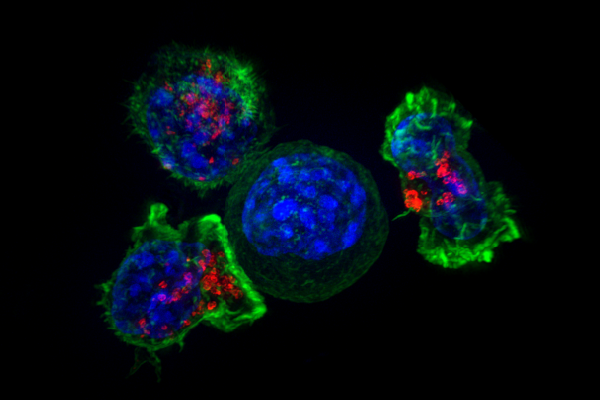Immunotherapy prior to surgery is effective in colon cancer

Patients with colon cancer but without distant metastases can benefit from a short course of immunotherapy while waiting for their surgery, as it can cause tumours to shrink substantially or clear up in a very short time. The patient’s own immune cells clear away the cancer cells. This is the finding of a NICHE study by the Netherlands Cancer Institute, an innovatory phase II clinical trial. In patients with a specific subtype of colon cancer (MSI), 100% of the patients benefited from the therapy. Twenty-five percent of those with MSS type benefited.
Medical oncologist Myriam Chalabi and her fellow researchers will publish these results on Monday 6 April in the journal Nature Medicine.
Neoadjuvant immunotherapy
Immunotherapy prior to surgery is referred to as neoadjuvant immunotherapy. The aim is to prevent the cancer returning or metastasising, and in the case of large tumours, to make surgery easier. The main idea is to familiarise the immune system with all the tumour variations before the tumour is removed, enabling the system to respond better. Colon cancer is the second type of cancer, after melanoma, for which researchers at the Netherlands Cancer Institute have shown the effect of neoadjuvant immunotherapy in a scientific journal. Studies on other types of tumours are still in progress.
Forty patients with two colon cancer subtypes took part in the NICHE study. Twenty of them had the microsatellite-instable (MSI) subtype, which means that the tumour is highly susceptible to mutation, resulting in hundreds of mutations. Of all patients with non-metastasised colon cancer, 15% have this type, and the therapy was effective in all 20 patients. “A good response rate was on the cards in this group,” says Project Manager Myriam Chalabi. “But a 100% rate is unprecedented. You don’t dare hope it will be that good.”
The patients underwent surgery about four weeks after the first intravenous administration. During that short period, the vast majority of these tumours had cleared up completely or almost completely. “We could see clearly where the tumour had been, but the patient’s own immune cells had cleared away the cancer cells.”
Previous research had already shown that immunotherapy is effective against advanced metastasised colon cancer in this subgroup. There is a good scientific explanation: The more new mutations there are, the more non-self the tumour is, causing the immune system to spring into action.
25% response rate in patients with the ‘microsatellite-stable’ subtype of colon cancer
The remaining 20 patients in the NICHE study had microsatellite-stable (MSS) tumours. Tumours of this type, conversely, are known not to respond well to immunotherapy. To their great surprise, the researchers found that 25% of this group of patients also responded well. Given that 85% of all patients with non-metastasised colon cancer have this type, this is a hopeful outcome.
The researchers looked for an explanation of this surprisingly high response rate in the MSS group in the lab. To begin with, it was not easy. “We looked at all the usual suspects, but they weren’t the cause,” says Chalabi. “We didn’t see the same predictive factors as in melanoma, for instance. But in the end we did find a new biomarker. If that proves to be predictive in follow-up studies, it could provide a simple way of identifying patients with MSS tumours who could benefit from immunotherapy.”
An important added advantage of neoadjuvant studies is that they enable the precise effects of immunotherapy on excised cancerous tissue to be determined for individual patients. In that sense too, neoadjuvant therapy is making for a revolution in cancer research, with lab work and clinical practice becoming more integrated.
Pioneering neoadjuvant drug studies like NICHE also have a major impact on the work of oncology surgeons. The studies depend on their trust: Are surgeons willing to accept the waiting and the uncertainty? Myriam Chalabi says, “Our surgeons were very enthusiastic right from the start, otherwise we could never have carried out the trial.” The first aim of the NICHE study was therefore to show that operations could take place safely and according to schedule and that there would be no more post-operative complications than expected—which did indeed turn out to be the case.
Can surgery be dispensed with?
The researchers, like the patients, are very happy with the results of the NICHE study. Chalabi says, “Large tumours shrinking or clearing up completely within four weeks on average is a fantastic, unprecedented result. We’ve never seen a 100% response rate before.” The question, as raised by some patients in the trial, is whether surgery could perhaps be dispensed with altogether.
That would be too early, warns Chalabi, as “even if we find the tumour has gone when we operate, we cannot know in advance who will have a complete response, not even with the aid of scans.” Researchers therefore need to find an answer to this question: How can they know as far as possible before surgery whether patients will have a complete response? “It won’t be easy, but we’re busy working on it.”
What is the likelihood that a patient will still develop metastases once the tumour has cleared up completely or almost completely? “We think the risk is very low,” says Chalabi. “We’ve found that with melanoma. But first, we need to treat patients and monitor them for years before we can answer that question.”
Source: Read Full Article


